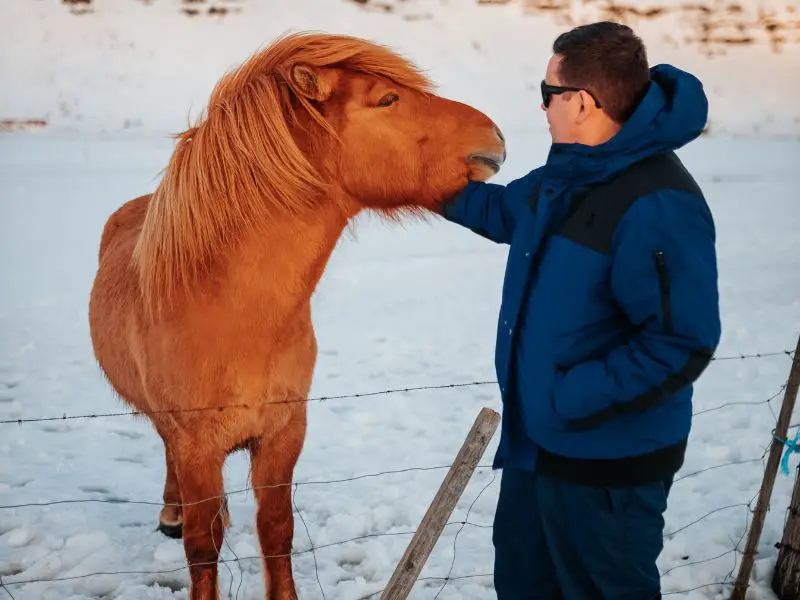How cold can horses tolerate? Horses can tolerate a wide range of temperatures, depending on the horse’s breed, age and health. Generally speaking, horses can handle temperatures as low as -40°F (-40°C) or so without any additional protection from the elements such as blankets or windbreaks. However, some breeds are better suited for cold climates than others, with Icelandic horses being one of the most cold-hardy breeds.
Young foals and older horses may not be able to withstand extreme cold quite as well due to their smaller body size and weakened immune system respectively. It is important that owners provide adequate shelter and nutrition when temperatures drop in order to keep their horses safe and healthy during winter months.
Horses are incredibly hardy animals and can stand up to a great deal of cold temperatures depending on the breed, age, and other factors. With their thick fur coats, horses are able to withstand winter weather down into the negatives with relative ease. It’s important to note that horses should not be left outside in temperatures below 15°F as they can suffer from frostbite and hypothermia.
Additionally, due to their large size and high metabolism, horses require extra hay or grain during colder months in order to stay warm and healthy.
When to Bring Horses in for Winter
When the temperatures start to drop and winter is approaching, it’s time to consider bringing your horses in from the pasture. Horses need a warm shelter during cold weather so they can stay healthy and safe from extreme weather conditions. It’s important to check daily for signs of distress such as shivering, dull coat or lethargy which could mean that the horse needs extra protection from the elements.
If you have access to a stable or barn for them, bring them in! Make sure you provide adequate bedding and hay as well as water that won’t freeze over. Additionally, don’t forget about grooming; regular brushing will help keep their coats clean and healthy throughout the season.

What Temp Should You Blanket a Horse?
When it comes to deciding what temperature you should blanket your horse, the answer can vary depending on a few factors. Generally speaking, if temperatures are hovering around 40 degrees Fahrenheit or below and there is no wind chill factor, then blanketing your horse may be necessary. Additionally, you must factor in the coat of your individual horse; for example, if they have a thin winter coat due to age or genetics then blanketing may be essential even at slightly higher temperatures.
When making this decision always err on the side of caution and use common sense- if it’s cold enough that you need to bundle up before going outside then chances are that your horse needs some extra protection from the elements too!
Can Horses Live Outside in the Winter?
Yes, horses can live outside in the winter. However, proper care must be taken to ensure that they stay healthy and comfortable during this season. Their coats need to be regularly groomed to prevent them from becoming too matted and cold.
They should also have access to shelter such as a barn or stable so they can retreat from extreme weather conditions if needed. Additionally, it’s important that their food supply is kept up even in winter months as they may struggle with finding grazing opportunities when the ground is covered in snow or ice. Lastly, blankets are recommended for colder temperatures so your horse stays warm while outdoors – especially during long periods of time where there isn’t much activity like overnight when temperatures tend to dip lower than usual.
With these precautions taken into consideration, you can rest assured knowing your horse will remain happy and safe throughout wintertime!
Do Horses Need a Shelter in Winter?
In winter, horses need shelter from the elements to remain healthy and safe. A well-built horse shelter can provide protection from wind, rain and snow. It should be designed to keep the animal warm and comfortable during cold weather conditions.
The ideal structure for a horse’s winter shelter is one that has four walls with an overhanging roof extending beyond each wall; this helps protect against wind and precipitation while still allowing airflow through the space. Insulation materials such as straw or hay bales can also be used in conjunction with proper ventilation to help reduce drafts within the confined area of the shelter. Additionally, you will want to make sure that your horse has access to clean water at all times so they do not become dehydrated in colder temperatures where their body may struggle more than usual with hydration levels.
Ultimately, providing your horse with a well-constructed winter shelter will ensure they are protected from harsh weather conditions while keeping them as comfortable as possible throughout the season!
How Do Horses Stay Warm in Extreme Cold?
Horses are amazing creatures that can adapt to a variety of climates and temperatures. In extreme cold, horses have several ways of staying warm. First off, they rely on their thick fur coats to help maintain body temperature.
The horse’s coat is made up of long guard hairs which trap air next to the skin and keep the heat in while also keeping out moisture from rain or snow. A thicker coat is essential for colder climates as it provides better insulation against the elements. Additionally, horses will grow longer hair in winter months; this extra layer helps protect them even further against the chill.
Second, horses have developed an adaptation called counter-shading in order to stay warm in cold weather – meaning they lighten their underside so more sunlight can be absorbed into their bodies and reduce heat loss through radiation when temperatures drop at night time. This strategy works especially well if there is still some sun present during winter days! Lastly, a healthy diet full of calories helps ensure that your horse has enough energy reserves for maintaining its core body temperature when outside temperatures dip down low.
During these times hay may need to be supplemented with high-fat sources like grain or vegetable oil that contain additional calories needed for warmth production. Together these strategies help horses stay comfortable during cold winters!
Are Those Horses Cold? An Informative Guide
Conclusion
In conclusion, horses are very tough animals that can handle extremely cold temperatures better than humans. With the right management and care, they can easily survive in harsh winter climates. Proper nutrition, shelter, and monitoring of their health will help them remain healthy during the colder months.
Keeping your horse warm and comfortable is essential for its well-being during any season but especially in the winter when temperatures drop below freezing.






